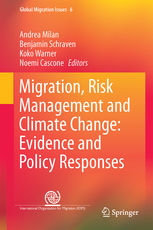
Remittances for adaptation: an "alternative source" of international climate finance?
Bendandi, Barbara / Pieter PauwExternal Publications (2016)
in: Andrea Milan / Benjamin Schraven / Koko Warner / Noemi Cascone (eds.), Migration, risk management and climate change: evidence and policy responses (Global Migration Issues), Berlin, Heidelberg: Springer, 195-211
ISBN: 978-3-319-42920-5
Information
Whilst not ignoring ethical arguments that oppose remittances of poor migrants as an alternative source for adaptation finance for developing countries, this chapter examines empirical evidence from literature on remittances against ten climate finance criteria as negotiated under the UNFCCC Copenhagen Accord to understand whether remittances could constitute international adaptation finance. Our analysis finds that incentives need to be provided in order to channel remittances towards adaptation. Remittances could match criteria such as ‘adequate’ and ‘predictability’. However, criteria such as ‘improved access’ can only be matched if developed and developing countries create the right incentives to reach out to the potential diaspora investors. A criterion such as ‘transparent’ is unlikely to be met by remittances. Whether remittances contribute to the USD 100 billion climate finance pledge is, in the end, a controversial political decision, but in any case remittances can help to support adaptation at household and community level. Public climate finance could increase the potential of remittance for such purposes.
